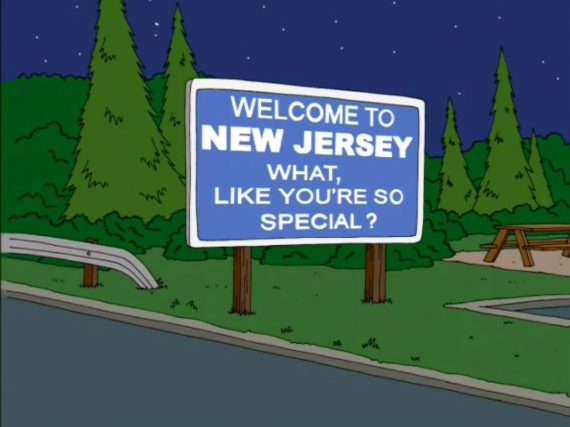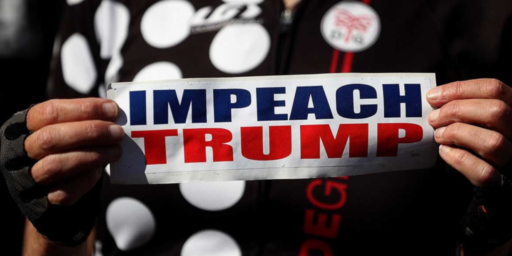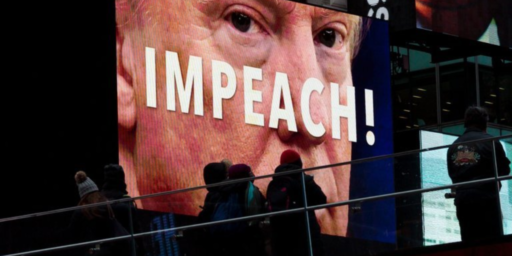A Note on the Party-Switch
I think Representative Van Drew has made a miscalculation.

As Doug Mataconis noted this morning, Representative Jeff Van Drew of New Jersey’s second congressional district, is switching his party affiliation from Democrat to Republican. Doug is correct to call this “political opportunism” in the sense that Van Drew is clearly calculating his best way forward to re-election given the make-up of his district.
This is how politicians behave. They want to be re-elected. To be re-elected they have to appeal to the voters in their districts. Indeed, this is how we should want the system to work.
Now, having said that, I think that Van Drew is probably doomed and this mid-term switch will not help him in his re-nomination fight. As such, while the partisan make-up of his districts makes his re-election problematic in a presidential year, his best bet was probably to stay a Democrat, because with the party switch he may not make it to the ballot in November of 2020.
In 2016 the incumbent Republican Representative, Frank LoBiondo, won re-election in NJ02 59.2% to 37.2% for the Democratic challenger. The seat was open in 2018 when Van Drew won it 52.9% to 45.2%.
2018 was a favorable year for Democrats in general. 2020 will increase the odds, however, that a Republican district will vote Republican for House, since presidential years increase turnout (and if you increase turnout in a GOP district, the odds are you are increasing GOP turnout more than Democratic turnout).
So, Van Drew is probably correct that a Republican has a better shot at NJ02 than does a Democrat in 2020. However, he has probably miscalculated his personal chances. He is now going to have win nomination as a Republican, facing off with other Republicans. This will likely be harder than winning re-election as the incumbent Representative from his district. I understand, for example, why he would be opposed to impeachment from a strategic POV.
Also: note that he has diminished his own power for the remainder of his term: being the minority stinks in terms of influence.
In terms of the politics of the moment, the number of Democrats voting against impeachment just went down by one. To be honest, he (and the Republicans) would have gotten more mileage out of him being a Democrat who voted against impeachment than anyone will get out of him being one of the sea of Republicans who vote against.
I predict he is now at the zenith of his political career and it is all downhill form here. He will not be all that unique for the vote, he will be limited in his influence for the rest of his term, and he likely won’t be nominated by the GOP.






When he switches parties, Van Drew will be unique in one aspect: he will be the only Republican to have endorsed Cory Booker for President.
That probably doesn’t bode well for his future in the GOP…
I suspect you’re right about his political career soon turning into a fond memory. But we don’t know what else he was promised in his meeting with Trump and Trump’s accomplices.
Party switchers never do well. Long term.
They are judged by voters as untrustworthy.
Opportunists, turncoats, pliable.
@de stijl: It had viability in the 1980s and 1990s when the parties were re-aligning. For example: Alabama’s senior Senator, Richard Shelby, was initially elected as a Democrat but switched parties after the Republican Revolution in 1994. He remains happily in office and largely unassailable at the ballot box.
These days, the polarized nature of the system makes that hard–although Susan Collins might have been better off with a party switch.
No, it isn’t. Really.
We should want politicians to explain to voters their philosophy of governance, their economic theories and goals, and their societal priorities. The voters can pick the one who most closely matches their own views, and that person can then represent the voters’ interests in whatever way they think best. If the voters don’t like that way, they can elect someone else.
On no account should politicians simply be advocates for the beliefs of their constituents. That’s the road to Trumpville, and the bridge is out.
@DrDaveT:
I appreciate and love what you advocate, but it simply isn’t true.
People vote for folks who promise to punish and humiliate the Other that do not vote the way we do.
Voting is now primarily a dominance exercise rather than a policy preference.
@de stijl:
No argument here. Doug was making a normative statement about how we should want representative government to work. I was objecting that pandering is not the ideal. I am well aware of the current situation. I suppose it’s a feature that current GOP voters wouldn’t vote for a Democrat no matter how much they pandered, thanks to Fox News. It reduces the temptation.
@DrDaveT: All I am saying is that we should want politicians to be responsive to the positions of citizens in their districts.
We should want a system that is responsive to constituents.
Those are two very different claims. I agree with the second, and disagree strongly with the first.
Yes, the system should be responsive to constituents. That does not imply that individual politicians should be mere proxies for their constituents, with no beliefs or agendas of their own. I don’t want a representative who will do what I would have done off the top of my head; I want a representative who shares my goals and values and will study the issues and evaluate the compromises and do the best thing overall to achieve those goals and protect those values, in the larger context of finite resources and necessary compromise.
I want a statesman, not a mere politician or advocate, and I want her to be on my side personally as well as professionally.
@DrDaveT:
Well, sure, that would be great, but this does not describe most politicians.
@Steven L. Taylor:
Again, you made a statement about what we should want. If you had said that the best we can reasonably hope for is a mercenary shill who stays bought, I wouldn’t have objected. I’m just noting that, in the ideal case, voters have the option to vote for candidates who share their goals and values. If politicians will advocate for whatever the majority wants, we only need one candidate.